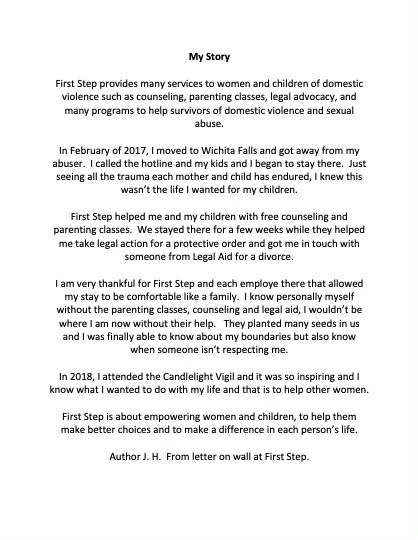Paying It Forward: Safe Shelter, a Basic Need
Maslow’s fundamentals: food, sleep and water; then sufficient finances for safe shelter. A scream and a boom awakens a child again as parents argue. 1 in 3 Texans will expience domestic violence.
If you’re in immediate danger, or need immediate medical assistance, call 911.
For anonymous, confidential help available 24/7, call First Step, 1-800-658-2683 or
the National Domestic Violence Hotline at 1-800-799-7233 (SAFE) or 1-800-787-3224 (TTY).
Maslow’s hierarchy of needs prescribes food, sleep and water as the first order imperatives necessary for any individual. Once secured, now the basic needs include sufficient finances for safe shelter and health.
Imagine a child, awakened in the night as their parents argue. Raised voices, the crash of a breaking plate, a scream, boom then silence. The child sits up, hunched over and shudders. Then hearing sobbing, lays back down to sleep. Another stressful night, limited dreams, a broken family ends another tumultuous day.
“1 in 3 Texans have or will experience domestic violence at some point in their lives,” shared with Crystal Carroll, Outreach Advocate and Volunteer Coordinator for First Step, during Monday’s visit. In order to understand, First Step offers some thoughts regarding the dynamics of domestic violence. First Step offers a comprehensive set of services for victims and survivors of domestic abuse and sexual assault, as well as impacted family members.
First Step serves twelve area counties: Archer, Baylor, Childress, Clay, Cottle, Foard, Hardeman, Jack, Montague, Wichita, Wilbarger, Young. In 2023 their community engagements included:
1102 calls to the 24-hour hotline.
7,425 people attended educational presentations
6, 397 services provided by First Step to persons in need.
Comprehensive services include emergency shelter (typically one-two months), counseling, legal advocacy for victims and survivors of domestic abuse and sexual assault as well as their family members that may be impacted.

One resource from First Step is a safety plan. A safety plan is a written or mental plan to keep yourself safe during an incident when domestic violence is present in the relationship, or after you’ve left the relationship, but a threat of violence still remains.
Safety Plans detail places you can go to be safe, people you can safely talk to about the situation, things to take when you leave, how to get help and stay safe, and much more. An example of a safety plan can be found here. If you need help coming up with your own Safety Plan, First Step advocates can help.
Remember, Call 911 in immediate danger, or needing immediate medical assistance.
Published Wichita Falls Times Record News, Trends Section, Sunday June 16, 2024.
Jack Browne is a community volunteer and former technology sales and marketing executive who worked 40 years at Motorola, MIPS Technologies and other companies. How are the children doing



